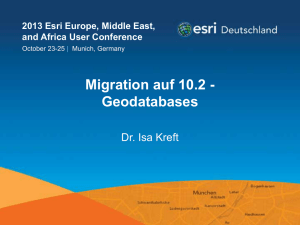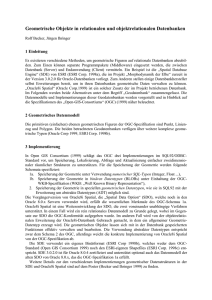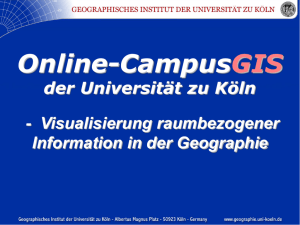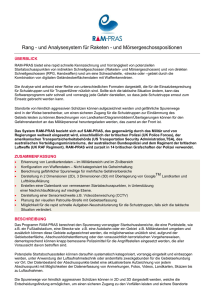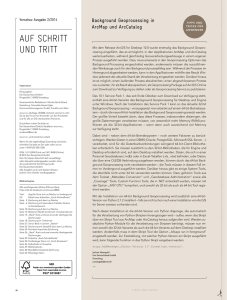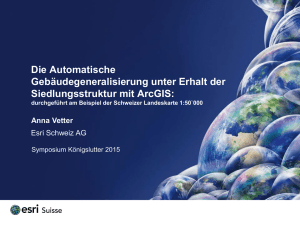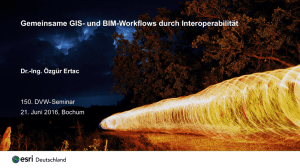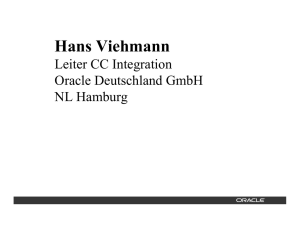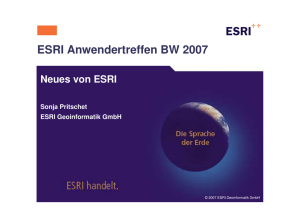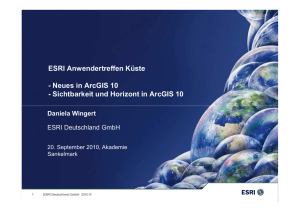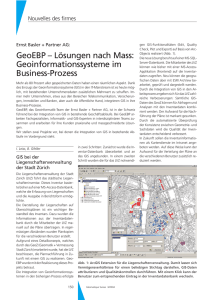20140507 Modellierung ESRI J.Manegold
Werbung
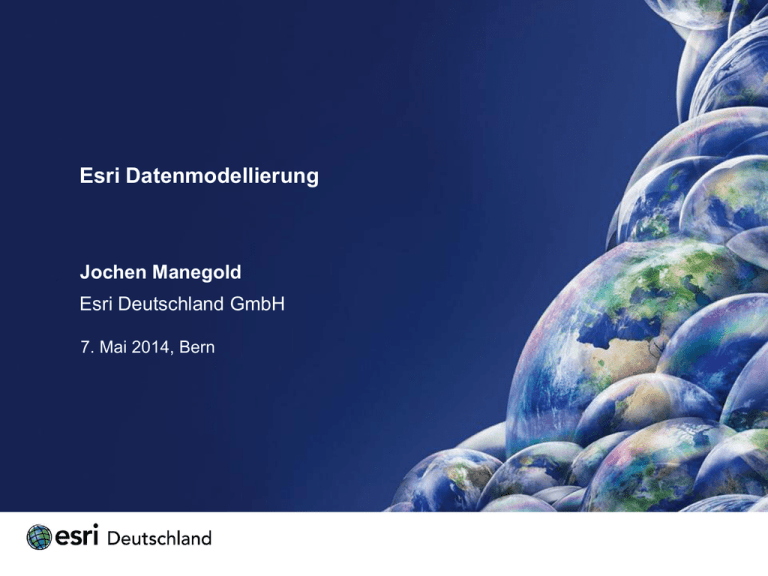
Esri Datenmodellierung Jochen Manegold Esri Deutschland GmbH 7. Mai 2014, Bern Agenda 09:40-11:30 + Das Esri Framework für Geodaten > Unterstützte Datenformate > Esri Database Framework > Esri Geodatabase Framework > Änderungen in 10.2 > Hilfswerkzeuge der Modellierung + Der Esri Modellierungsprozess > Ausgangsparameter > Database Design > Finalisierung + Zeit für Fragen und Diskussion 2 © 2014 Esri Deutschland GmbH Das Esri Framework für Geodaten 3 © 2014 Esri Deutschland GmbH Unterstützte Datenformate + in ArcGIS Mindmap http://resources.arcgis.com/en/help/main/10.2/#/List_of_supported_raster_and_image_data_formats/009t0000000v000000/ 4 © 2014 Esri Deutschland GmbH Unterstützte Datenformate + in ArcGIS Data Interoperability Extension http://www.esri.com/software/arcgis/extensions/datainteroperability 5 © 2014 Esri Deutschland GmbH Modellieren ist nur dann notwendig, + wenn die Daten nicht in einem unterstützten Format zur Verfügung gestellt werden können + wenn dee Daten die notwendigen Workflows/Prozesse nicht unterstützen > Multiuser Editing > Replikationen (Offline Editing) > Topologie, Network Datasets 6 © 2014 Esri Deutschland GmbH Esri Database Framework + Datenbanken > Oracle > SQL Server > IBM DB2 > IBM Informix > Netezza > PostgreSQL > Teradata > Windows Azure SQL Database > SQLite 7 © 2014 Esri Deutschland GmbH Esri Database Framework + Geometrie > Native Spatial Type > ST_Geometry 8 © 2014 Esri Deutschland GmbH Esri Database Framework + Supported Data Types > Blob > Date > Double > Float > GlobalID > GUID > Long Integer > ObjectID > Raster > Short Integer > Text 9 © 2014 Esri Deutschland GmbH Esri Geodatabase Framework + Versionierung > Replikation > Planungsversionen > Multi-User Editierung 10 © 2014 Esri Deutschland GmbH Esri Geodatabase Framework + Datasets > Topology > Network Dataset > Geometric Network > Terrain > Parcel Fabric 11 © 2014 Esri Deutschland GmbH Esri Geodatabase Framework + Erweiterte Featureclasses > Annotations > Dimensions > Subtypes 12 © 2014 Esri Deutschland GmbH Esri Geodatabase Framework + Relationships > Simple > Composite + Rules > Domains > Connectivity Rules > Relationship Rules 13 © 2014 Esri Deutschland GmbH Esri Geodatabase Framework + Personal Geodatabase (.mdb) + File Geodatabase (.gdb) + ArcSDE Geodatabase > Oracle > SQL Server > IBM DB2 > IBM Informix > PostgerSQL 14 © 2014 Esri Deutschland GmbH Änderungen in 10.2 + Abkündigungen > ArcSDE C/Java API > ArcSDE Application Server > ArcSDE Commandline Tools 15 © 2014 Esri Deutschland GmbH Änderungen in 10.2 + Neuerungen > Administrations-Tools (Geoprocessing Framework) > Vereinfachte Installation 16 © 2014 Esri Deutschland GmbH Hilfswerkzeuge der Modellierung + ArcGIS Application Framework > ArcCatalog + Geoprocessing Framework > Geoprocessing-Tools – Create… – Import/Export… > ArcPy/Python > Modelbuilder + ArcGIS Data Interoperability Extension 17 © 2014 Esri Deutschland GmbH Der Esri Modellierungs prozess 18 © 2014 Esri Deutschland GmbH Ausgangsparameter + Informationsprodukte + Client-Devices + Verteilungsplattform + Prozesse + Database/Geodatabase Framework + … 19 © 2014 Esri Deutschland GmbH Informationsprodukte + Layer Definition > Spatial – Non Spatial > Geometry Types > Symbolik > Attribute 20 © 2014 Esri Deutschland GmbH Client-Devices + Esri Clients > Esri Framework für Geodaten + Non Esri Clients > ArcObjects > ArcGIS Runtime SDKs > ArcSDE C/Java API > File Geodatabase API > SQL 21 © 2014 Esri Deutschland GmbH Verteilungsplattform + Feature-Service > Simple Features (View, Edit) + Database-Connect > Query Layer, Query Table (View) + Geodatabase-Connect > Direct Connect, Application Server Connect (View, Edit) + SQL > Native Geometry types, Versioned Views (View, Edit) 22 © 2014 Esri Deutschland GmbH Prozesse + Editierung > Versioniert, nicht Versioniert + Ableitungen + Beauskunftungen 23 © 2014 Esri Deutschland GmbH Geodatabase Framework + Featureclass/Objectclass > ObjectID > Geometry > Spatial reference > Supported Data Types + Database Views 24 © 2014 Esri Deutschland GmbH Database Framework + Nur unterstützte Datentypen + Nur EIN(E) > Spatial Column > Geomtery Type > Dimensionality > Spatial Reference 25 © 2014 Esri Deutschland GmbH Design + Design from Scratch + ArcGIS Data Model Design + Design Tips 26 © 2014 Esri Deutschland GmbH Design from Scratch: Design follows Function + Leicht verständlich + Leicht implementierbar + Sollte sein > flexibel > erweiterbar > adaptierbar 27 © 2014 Esri Deutschland GmbH Design from Scratch + „Data Themes“ (Layer) identifizieren > Geometry Type (Raster, Punkte, Linien…), Attribute 28 © 2014 Esri Deutschland GmbH Design from Scratch + Layer – Featureclass (1:1) > Bodenarten > Fließgewässer + Layer – Featureclasses (1:n) > Transportnetze (Strassen, Kreuzungen, Brücken, Auffahrten …) + Layers – Featureclass (n:1) > Subtypes, Definition Queries 29 © 2014 Esri Deutschland GmbH Design from Scratch + Layer – Layers (1 : n) > Kataster, Topografische Karte 30 © 2014 Esri Deutschland GmbH Design Steps + (1) Identify the information products that you will create and manage with your GIS > Maps und WebMaps, Models, Reports… + (2) Identify the key data themes based on your information requirements > Layer für geplanten Workflows > Map Use, Data Sources, Spatial Representations for different MapScales > Symbology, Labeling 31 © 2014 Esri Deutschland GmbH Design Steps + (3) Specify the scale ranges and the spatial representations of each data theme at each scale > Generalisierung, Resampling + (4) Decompose each representation into one or more geographic datasets > Featureclass, Datasets 32 © 2014 Esri Deutschland GmbH Design Steps + (5) Define the tabular database structure and behavior for descriptive attributes > Attribute, Domains + (6) Define the spatial behavior, spatial relationships, and integrity rules for your datasets > Networks, Topology 33 © 2014 Esri Deutschland GmbH Design Steps + (7) Propose a geodatabase design > Evtl. mit ArcGIS Data Models abgleichen + (8) Design editing workflows and map display properties > Versionierung, Replikationen, Regeln, Tools + (9) Assign responsibilities for building and maintaining each data layer > Import, Update etc. > Archivierung 34 © 2014 Esri Deutschland GmbH Design Steps + (10) Build a working prototype. Review and refine your design > funktional testen (auch mal mit größeren Datenmengen) + (11) Document your geodatabase design > z.B. Geodatabase Diagrammer http://www.arcgis.com/home/item.html?id=a378b48be11b45b5bb25254643304cb7 35 © 2014 Esri Deutschland GmbH ArcGIS Data Model Design + Geodatabase Data Model Templates http://support.esri.com/en/knowledgebase/techarticles/detail/40585 > Templates > Dokumentationen jump-start your design 36 © 2014 Esri Deutschland GmbH ArcGIS Data Model Design + (1) Download Data Model from Esri Support Center + (2) Create an empty File Geodatabase + (3) Import the Schema + (4) Set up Spatial Reference for the content + (5) Load some Data + (6) Test and Refine the Design 37 © 2014 Esri Deutschland GmbH Design Tips + (1) Build on your existing GIS designs + (2) Use generic geodatabase types whenever feasible + (3) Integrate related feature classes using topology + (4) Combine GIS design concepts from this section with traditional relational database design methods + (5) Prototype and pilot your geodatabase design 38 © 2014 Esri Deutschland GmbH Finalisierung + Storage Management (DBTUNE Keywords) + Benutzer- und Rollenberechtigungen > Datenbank Nutzer > Operating System Nutzer + Indices > Spatial Index > Attribute Index + Statistiken, Reconcile/Post, Compress > Python 39 © 2014 Esri Deutschland GmbH Zeit für Fragen und Diskussion 40 © 2014 Esri Deutschland GmbH
